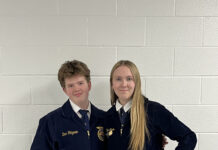WASHINGTON — In the merry-go-round ride of legislation referred to as the country-of-origin labeling (COOL), two pieces of legislation were introduced July 23 to avert a trade war with Mexico and Canada over COOL.
With an attempt at finding a solution, several senators joined together in a bipartisan effort to introduce legislation that would make country of origin labeling voluntary.
Legislation introduction
U.S. Sen. Sherrod Brown, D-Ohio, announced he was cosponsoring a bipartisan Voluntary Country of Origin Labeling Act of 2015 along with Sen. Debbie Stabenow, D-Michigan, and John Hoeven, R-North Dakota.
The bill would allow the U.S. to avoid retaliatory tariffs by repealing the mandatory COOL law and replacing it with a voluntary program that will enable processors to voluntarily label meat products. The COOL Act would maintain the integrity of the label, ensuring that the product is actually “born, raised and slaughtered in the United States,” rather than just processed in the U.S.
This bill, like the existing law, calls for labels to provide information on where animals are born, raised and slaughtered. But opponents say it still would necessitate segregation of Canadian and Mexican livestock, leading to discrimination against them — a violation of international trade rules.
WTO ruling
The new legislation follows the World Trade Organization’s ruling that the United States’ mandatory country-of-origin labeling law for imported cuts of beef, chicken, and pork violates international trade agreements,
In May, the World Trade Organization ruled for the fourth time that the United States’ mandatory COOL law treats Mexican and Canadian livestock less favorably than U.S.- origin livestock, and violates international agreements.
Punitive tariffs
The WTO decision allows punitive tariffs to be put on U.S. goods going into Canada and Mexico, which are asking for a combined $3.1 billion in retaliation. A WTO arbitrator now is determining the level of retaliation.
Both Mexico and Canada say they intend to implement retaliatory tariffs should the U.S. fail to address the current COOL law.
“Americans deserve to make informed decisions when it comes to food they put on the table,” said Brown. “While I prefer mandatory country-of-origin labeling and disagree with the World Trade Organization’s ruling, we need to take action to keep consumers safe while avoiding retaliatory trade sanctions from Canada and Mexico.”
Brown said a voluntary country-of-origin labeling program would benefit both producers and consumers, while ensuring the U.S. meat industry stays in compliance with the WTO.
Forward path
National Farmers Union President Roger Johnson said the introduction of the bipartisan compromise is the only path forward for food labeling.
“This is the only politically viable means of preventing Congress from completely stripping away a clear national label for livestock born, raised, and slaughtered in the U.S. by developing a clear, strong, and honest ‘made in the USA’ label that consumers can ask for and trust,” said Johnson in a prepared statement.
Johnson noted that it wasn’t easy for NFU to accept the loss of mandatory labeling, which it has pushed for over two decades, but also acknowledged that consumers and farmers will at least be left with a labeling option that has integrity.
Not good enough
Canada issued a statement rejecting the Senate’s voluntary approach and said it would continue to pursue retaliation.
“The only acceptable outcome remains for the United States to repeal COOL,” said Canadian Agriculture Minister Gerry Ritz and International Trade Minister Ed Fast.
“While we appreciate Sen. Stabenow’s efforts, we can’t support her bill because it would continue key features of a labeling regime that’s already been found to violate WTO rules,” National Pork Producer Council’s Ron Prestage said. “More importantly, it doesn’t satisfy Canada and Mexico, so it won’t stop retaliation, and we can’t afford to have our products restricted, through tariffs, to two of our top three markets.
Senate Agriculture Committee Chairman Pat Roberts, R-Kansas, offered an amendment to a highway funding bill to repeal country-of-origin labeling requirements for beef, pork and poultry.
Long process
Although the United States could seek a WTO ruling on voluntary labeling or any other legislative proposal to which Canada and Mexico object, that process could take as long as two years, and Canada and Mexico likely would continue retaliating pending a decision.
The current WTO arbitration panel will not review any new U.S. COOL proposal but only will determine the level of retaliation.










4 times COOL has been found violate international trade rules. How many more rulings need to be made on this?